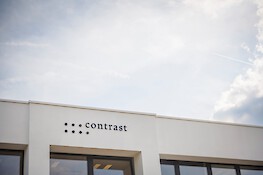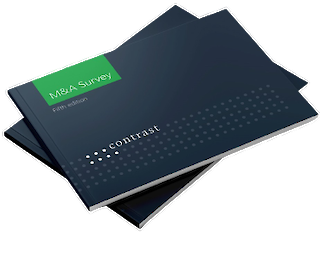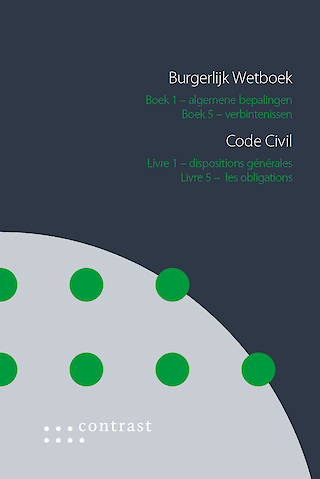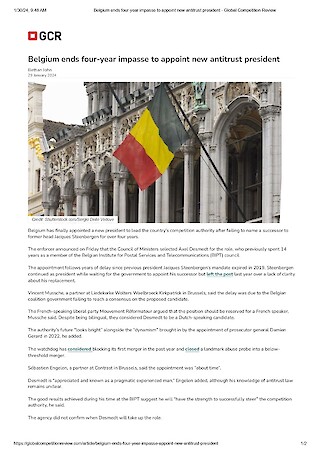In the Picture
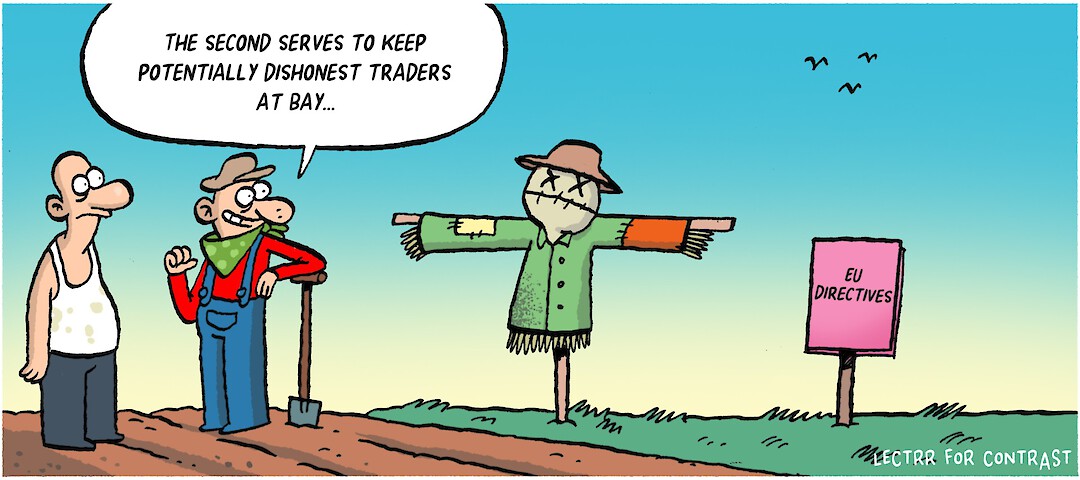
Regulation of B2B relationships: new rules for protecting suppliers in the European food supply chain
June 2021Imagine…
You are the head of the legal department of a company with activities throughout the EU. Your company does business essentially with professional customers (B2B).
You have long had the habit of participating in the annual European conference for company lawyers, where you meet fellow legal counsels from different EU countries and a wide range of sectors.
In your conversations this year you note that the increasing regulation of B2B relationships and contracts is becoming quite a hot topic. In the past, it was primarily B2C relationships and contracts that were strictly regulated, but now you are finding that a company must ever more frequently take into account all kinds of mandatory rules relating to B2B practices and contracts.
Recently, new regulations entered into effect on the EU level relating to certain unfair trading practices. Naturally you want to know all about them.
A brief clarification.
Europe is seeing a growing trend towards regulation of B2B relationships and contracts. In recent years, several EU Member States have adopted either new or tighter rules that apply to the relationships between companies. This is being implemented via (amongst other things) unfair trade practices legislation, with specific rules on unlawful clauses in the B2B context. The bilateral business relationship between companies is being increasingly regulated in competition law as well, e.g. under the denominator of “abuse of relative power position” or “abuse of economic dependence”.
The Directive (EU) 2019/633 of the European Parliament and of the Council of 17 April 2019 that the European Union adopted in April 2019 to combat unfair trading practices in business-to-business relationships in the agricultural and food supply chain, fits within this trend. The purpose of this Directive is to offer farmers, farmers´ organisations and other suppliers of agricultural and food products throughout the EU the same minimum level of protection against stronger buyers. The Member States have the right to offer more extensive protection if they so desire.
The Directive had to be transposed into national regulations by 1 May 2021 at the latest, and will enter into force as of 1 November 2021. The concrete consequence of the Directive is that certain current trading practices will no longer be possible, or only conditionally.
More specifically, the Directive prohibits ten trading practices (black list), while allowing another six trading practices only if they are clearly and unambiguously agreed between the supplier and the buyer (grey list).
An example of a trading practice on the black list is a payment period for the buyer of more than 30 days for perishable agricultural and food products, and 60 days for other agri-food products. The transfer of the risk of deterioration or loss to the supplier and short-notice cancellations of orders of perishable agri-food products are also on the black list.
The grey list includes the return of unsold agricultural and food products to the supplier without payment, but also the payment by the supplier for the promotional, advertising or marketing campaign of its buyer.
The protection applies along the entire agri-food supply chain. This includes the sale of both agricultural products (such as meat, fish, shellfish, flowers, vegetables, fruit, grains and milk) and food products that are processed on the basis of these agricultural products (such as chocolate, prepared sauces and yoghurt).
The protection applies if certain turnover thresholds are exceeded. For this purpose, suppliers and buyers are divided into six categories, on the basis of their annual turnover. The protection applies in each case for a supplier who finds himself in a lower turnover category than its buyer. An example: for a supplier with an annual turnover of between two and ten million euros, the protection applies vis-à-vis buyers with an annual turnover of more than ten million euros. If the latter has an annual turnover of less than 50 million euros, and he resells the products to a buyer with a turnover of more than 50 million euros, he is protected as a supplier in turn.
The Directive itself does not establish any penalties for infringements, leaving that task to the individual Member States. However, the Directive does provide that each Member State must adopt effective, proportionate and dissuasive sanctions, including fines and the possibility of imposing interim measures.
Concretely
- For their B2B activities, companies must increasingly take account of mandatory regulations concerning unlawful clauses and unfair trading practices.
- The extent of B2B regulation differs from country to country.
- Companies active in the food supply chain in the broadest sense of the term must henceforth also take account of a minimum protection that applies throughout the EU for smaller suppliers.
- The protection covers 16 trading practices, which are either prohibited (black list), or allowed only if they were clearly and unambiguously agreed between buyer and supplier (grey list).
- Infringements can give rise to national penalties, including fines.
- The EU Member States have the right to go further and offer more than just the minimum protection.
Want to know more?
- Here you can find a handy information brochure from the European Commission with an overview of all 16 protected trading practices: https://ec.europa.eu/info/sites/info/files/food-farming-fisheries/key_policies/documents/brochure-utp-directive_en.pdf
- You can consult the Directive itself via this link: https://eur-lex.europa.eu/legal-content/EN/TXT/PDF/?uri=CELEX:32019L0633&from=EN
- The list of products that belong to the agricultural and food supply chain can be found in annex 1 to the Treaty on the Functioning of the European Union: https://eur-lex.europa.eu/legal-content/EN/TXT/PDF/?uri=CELEX:12012E/TXT&from=EN
- You can find more information on the status of the transposition of the Directive in the various EU Member States here: https://eur-lex.europa.eu/legal-content/EN/NIM/?uri=CELEX%3A32019L0633
Please consult our website or contact one of our team members if you have questions or require more information:






